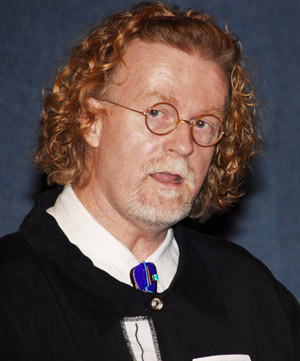Curt L. Tofteland
“Prison,” wrote reformer Sir Alex Paterson, “is a place where good may be done by infinite labor, and evil may be done automatically with no effort.” It is that infinite labor that is at the heart of Curt Tofteland’s story. Labor, as Warden Larry Chandler puts it, that “brings light to a dark place.”
Since 1995, under the direction of Curt L. Tofteland, convicted abusers, armed robbers and murderers imprisoned at the Luther Luckett Correctional Complex in LaGrange, Kentucky, have volunteered and recruited fellow inmates, chosen parts, rehearsed and performed 13 plays by William Shakespeare. “The past is gone,” Tofteland tells his unorthodox theater company, “there is only this moment.” Yet as they wrestle with Shakespeare’s words, the actors inevitably see their own lives and struggles and during nine months of rehearsals, they begin to better understand and to forgive themselves and to forge a new relationship with their families, their victims and the world beyond the razor wire.
Curt L. Tofteland was raised in a town of fewer than 100 people in North Dakota, 100,000 acres of farmland, his backyard. The eldest of five, Curt was charged with taking care of his brothers and sister. They all slept in the same room and he watched out for them and told them stories. He told stories to the four children who were in his class through elementary and middle school, and then to his 88 classmates in high school. He watched old Westerns, paying particular attention to the lessons of the Indian scouts: keep your eyes open and listen to the wind. He wrote poetry and plays, he sang and played music, and he felt like an outsider until he got to the University of North Dakota, with a potential audience of 8,000 students and a catalog filled with courses in creative writing, music and theater.
While in graduate school at the University of Minnesota, inspired by Franco Zefferelli’s 1969 film of Romeo and Juliet and a professor who taught actors to “wrap their lips and tongues and teeth around the language,” Tofteland threw himself into theater. When he received his Master of Fine Arts in Acting and found his way to Louisville, Kentucky, he began to teach theater to kids at risk, priding himself on his ability to handle the toughest cases.
In the early 90s, a program called Books Behind Bars, aimed at middle school students and adult male inmates, first brought him to the Luckett prison and got him thinking about how program participants might learn to “go deeper and inhabit the character” by using Shakespeare. By his fifth or sixth visit to the prison – working on fight scenes in Romeo and Juliet – Tofteland proved his thesis and found he loved the work.
Thirteen years later, he is still there. Working as a volunteer. Having accomplished his dream of running a theater company many times over, Tofteland is Producing Artistic Director of the annual Kentucky Shakespeare Festival in Louisville, under whose auspices he and a merry band of Shakespearean actors travel throughout the state to bring the Bard to students kindergarten through twelfth grade. At Luckett, not one of the 34 Shakespeare Behind Bars participants who won parole or served out their sentence has returned to prison for committing new crimes. All the “apprentice magic users,” like Prospero in The Tempest, found enough magic in Tofteland and Shakespeare to guide them toward a different future.
At the beginning of the award winning documentary by Philomath Films about Shakespeare Behind Bars filmed at Luckett in 2003-04, the camera captured the scene of three prisoners returning to their cells after a rehearsal for The Tempest, as one inmate asked the others, “How big can you dream?”
 Photo by Deena Corland
Photo by Deena Corland